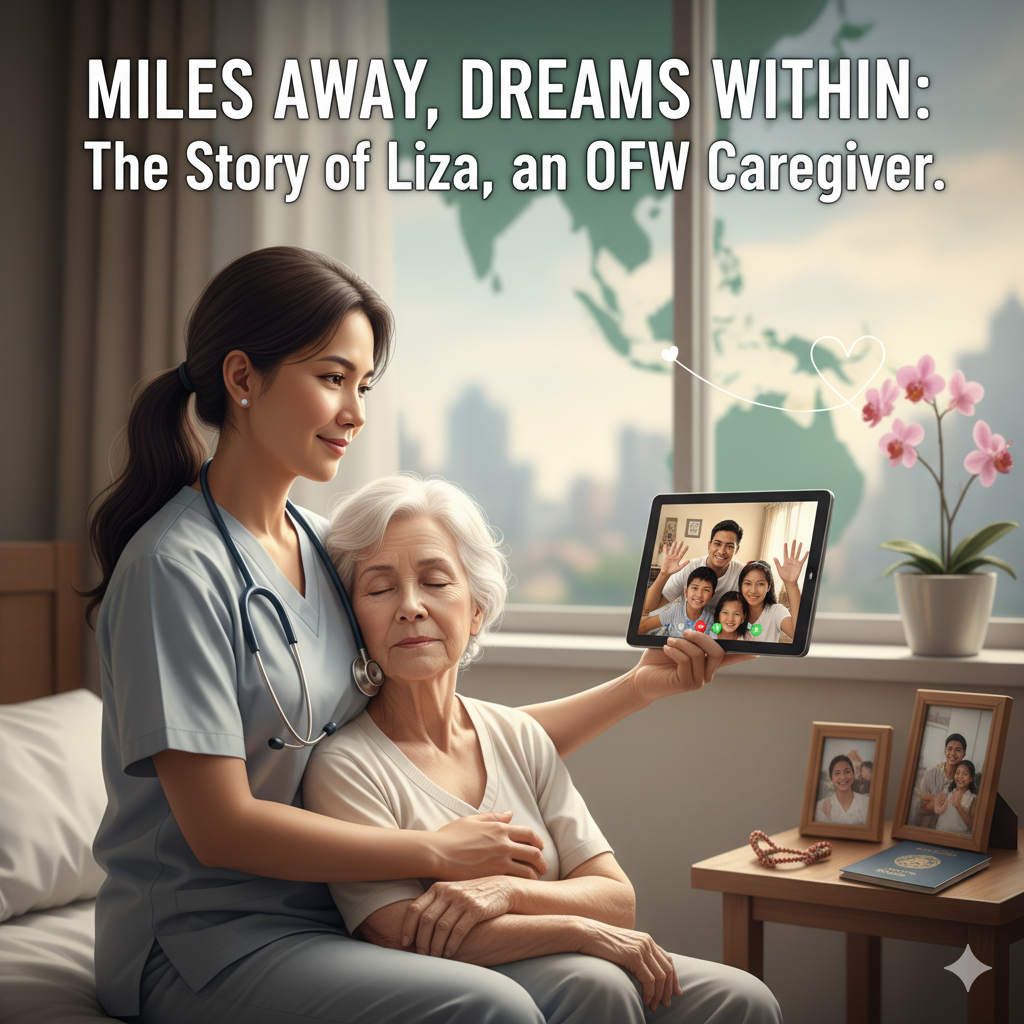Under the golden sun of her small town in Nueva Ecija, Liza Villanueva packed her suitcase with trembling hands. Each fold of clothing carried not jut fabric, but years of sacrifice, hope, and love for her family. She wasn’t leaving because she wanted to, she was leaving because she had to. Her two children were still in school, her husband’s tricycle business barely kept them afloat, and her aging parents relied on her for medicine. So when she was offered a job as a caregiver in Israel, she said yes even if her heart screamed no.
The day her departure was heavy with silence. Her youngest daughter, Bea, clung to her leg, refusing to let go. Mama, please don’t go, she cried. Liza knelt down, fighting back her tears, and whispered, Anak, I will come back soon. I promise. Mama just needs to work so you can study and have a better life. Those were the hardest words she had ever said.
When the airplane took off, Liza looked out the window, watching the land she called home fade beneath the clouds. She thought of all the birthdays, holidays, and ordinary days she would miss. But she also thought of the dreams she carried dreams of her children finishing school, of building a small home, and of living without debt.
Israel greeted her with a mix of beauty and challenge. The air was dry, the streets were busy, and the language was foreign. Liza worked for an elderly woman named Miriam, who had trouble walking and often forgot things. The work was tiring lifting, bathing, cleaning, cooking but Liza did it with care. Each time Miriam smiled and said “Toda, Liza” (Thank you, Liza), she felt a small reward for her exhaustion.
Still, every night when she lay in bed, the silence of her small room would echo her homesickness. She would scroll through her phone, looking at pictures of her children sent through messenger. Bea had lost her front tooth. Her son, Carlo, had joined a basketball tournament. She watched their lives unfold through a screen both grateful and heartbroken.
On her first Christmas abroad, Liza joined other Filipino caregivers in the park. They brought homemade adobo, pancit, and rice cakes. They laughed, sang karaoke, and called their families together. For a few hours, they weren’t just workers they were mothers, fathers, brothers, and sisters trying to find comfort in each other’s company. Liza realized she wasn’t alone in her struggle. Every OFW there carried a story like hers: stories of courage, longing, and sacrifice.
Months turned into years. Liza became part of Miriam’s family. She learned to speak basic Hebrew, found a church community, and even sent money home to start building their small house in the Philippines. Her husband would send her pictures of the construction a single wall at first, then a roof, then windows. Konti na lang, Ma, he’d say. Soon, you’ll have your own room when you come home. Those photos became her strength whenever she felt tired or lonely.
But life overseas was never easy. One night, Liza received a call that her father had passed away. She broke down on the floor, crying uncontrollably. She wanted nothing more than to fly home, to hold her mother and say goodbye properly. But her employer couldn’t release her right away, and she couldn’t afford to lose her job. So she mourned quietly, lighting a candle in her small room, whispering, Papa, forgive me for not being there.
That night, she understood what it truly meant to be an OFW to sacrifice not just time, but moments you can never get back.
When her three year contract ended, her employer begged her to renew. Liza, you are family, Miriam said, tears in her eyes. And though her heart longed to go home, Liza knew her responsibilities weren’t done. Bea was entering college, and Carlo wanted to take a vocational course. So she signed another contract.
Her second stay was easier in some ways she knew the routines, the people, the culture but harder in others. The loneliness deepened. She missed her children’s growing independence, her husband’s laughter, and the simple comfort of Filipino food. Yet, she found purpose in every task she did. She realized that caring for others was more than a job it was an act of love that connected her to humanity itself.
Years passed quickly, and finally, the day came when Liza decided to return home for good. Her children were grown; Bea had graduated as a teacher, and Carlo was managing a small repair shop. She had achieved what she came for. On the plane home, she looked out the window again, this time with a smile. The same sky that once carried her away was now guiding her back.
When she arrived at the airport, she was greeted by a sea of familiar faces. Bea ran to her, crying, Mama, you did it! Her husband hugged her tightly, whispering, Welcome home, my love. For the first time in years, Liza felt complete. The sacrifices, the tears, the sleepless nights they all led to this moment.
In their small but beautiful home, she finally rested. The walls she had paid for with her hard work now echoed with laughter and love. As she sat on the porch watching the sunset, she whispered a prayer of gratitude. Lord, thank you for giving me strength. For guiding me through every storm, For bringing me home.
Today, Liza shares her story with other aspiring OFWs in her town. She tells them that working abroad is not just about earning money it’s about perseverance, faith, and love. You will cry, she tells them. You will miss home. But remember, every sacrifice has meaning when done for the ones you love.
Her journey, like many OFWs, is one of courage and compassion a testament to the Filipino spirit that endures despite distance and hardship.
Though she once left her homeland chasing dreams across the sea, Liza learned that the true dream wasn’t in the money she earned or the things she bought it was in the lives she changed, both abroad and at home.
And as she gazed at the horizon that once took her away, she realized something profound; sometimes, we must go far away to truly find our way home.



